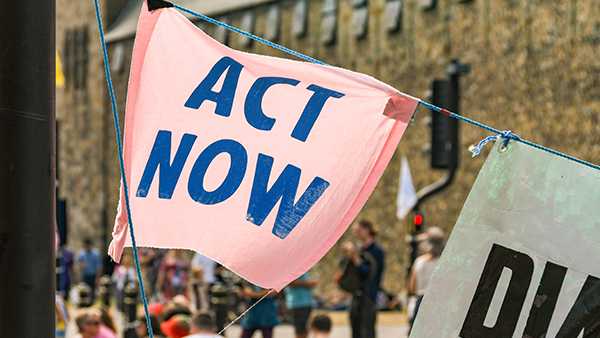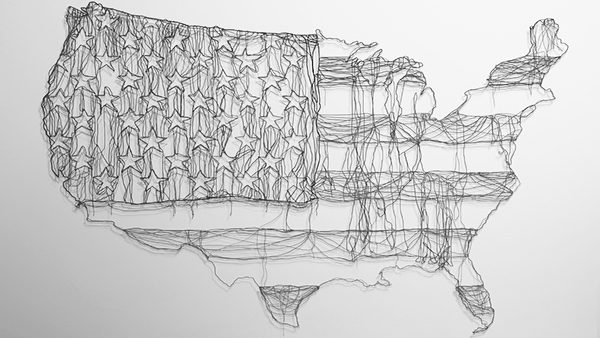Anthony Painter is the newest Director in the RSA's Action and Research Centre leading on the Independent Review of the Police Federation for which the RSA is acting as secretariat. Here he argues that the UK's democracy will be severely tested by the rise of UKIP.
UKIP has captured the headlines following their first convincing performance in a set of local elections. What has been largely ignored is that these results may hint at something rather more profound. It is commonplace to explain away any seemingly new political development as the ‘same as it ever was’. Yet, there is the possibility that the emergence of UKIP is just the latest manifestation of democratic stress. If so, this would have serious consequences for the ability of any party to govern effectively in the near future- even if they were in possession of a majority.
The psephologists, Colin Rallings and Michael Thrasher, project a small Labour majority on the basis of Thursday’s vote. This is rather unsurprising given that we are mid-way through the Parliamentary term. What is surprising is that this majority is secured on the basis of a 29 per cent national equivalent vote.
Given the very inefficient way that our electoral system turns support into seats, its singular virtue is that it produces majorities which, it is argued, is a recipe for stable government. Interestingly, in 1992-97 it failed to cushion the then Government from the instability of a small majority. Then in this Parliament it has failed to engineer a majority. In two parliaments of the last five, the UK has had either an absence of stability or majority. The benefits of the current system are over-stated.
At the same time, the negatives are considerable. Imagine for a moment that Thursday’s result was replicated in 2015. This is not a forecast, it should be emphasised but a low support, majority government is entirely with the realms of possibility. On the basis of national support of 29 per cent, we would have a Labour Government faced with enormous national challenges, having to make very difficult and unpopular decisions, with a majority of a handful of seats that would leave it susceptible to backbench rebellion. Unless some magical economic fairy bestowed her generosity on the Government, it is not difficult to imagine such a Government going into rapid meltdown at the first sign of difficulty. It is a shocking prospect. It would be a Government of the few at risk of capture by the even fewer.
Electoral democracy is a special type of ‘market’. In the UK’s case, it has exceedingly high barriers to entry. Dominant market players rarely become extinct in western democracies. In the UK’s case, it is even harder for the major three parties to face such a prospect – they just continue for long periods of time with a low market share. This was the case for Labour in the 1980s and the Conservatives in the 2000s. UKIP, like the SDP and the Green party before it, challenges the status quo and is likely to find convincing market entry beyond reach.
It’s rather like Napster and the music industry. They will create panic for a while – witness the Tories calling for an early European referendum – but eventually the market structure and legal framework will prove formidable. Eventually, the upstart is neutered then subsumed.
Before it collapsed, the SDP to a certain extent helped Margaret Thatcher to a landslide in 1983 and in part spawned New Labour. Like the SDP, UKIP will leave its mark as it responds to a portion of the electorate who are perturbed - even angry - at both political elites and the nature of national, cultural and economic change. The Searchlight ‘Fear and Hope Report’ suggested that this could be around 20 per cent or so of the electorate in England. It is not inconceivable that UKIP will win a seat or even a very small handful of seats at the next election. If they get their organisation right, they now know where their potential support is concentrated following Thursday’s results. Beyond that, it is difficult to see them making any real progress unless we are seeing a seismic re-configuration of the political ‘market’.
It would be easy to dismiss such a scenario but I wouldn’t completely rule it out. Again, building on the low support, small majority Labour government scenario, adding in two or three UKIP MPs, a Conservative party in disarray post-2015 and a distrusted Liberal Democratic party, where will disaffected voters then turn? What is being described here is a completely dysfunctional market. When we add in the diminishing ability of parties to hold on to support as voters become more footloose, it compounds the problem.
The desire to rig the market-place protects the dominant players but potentially undermines the market itself. Democracy is not a luxury product but nor is it a necessity – large numbers of people can simply choose not to participate with no noticeable and immediate direct impact on their lives.
We are in a situation of democratic stress . Political leaders of the dominant parties have two broad options. They can accept the risk, trusting the system to resolve itself and eradicate new entrants. This option means accepting that the space of democratic party politics may well diminish further. Or they can open out.
This means unpicking nepotistic, guild-like structures that retain control for a self-chosen few nationally and locally. Having used the duopolistic structure of the political ‘market’ to shield themselves, like any bureaucratic institution the major parties have failed to innovate and are now paying the price. The alternative path is to change parties as institutions through such mechanisms as primaries and looking at how to open out the electoral system and wider democracy. Yes, AV failed but it was a system promising little or even negative change. Constitutional reform may well be the preserve of ‘chattering classes’ but disdain for the current state of the UK politics is widespread. Linking that to change could be the route to real reform.
Given the strong path dependency that exists within party structures and amongst the leaders who have benefited from them, it is entirely likely that today’s leaders will choose the risk option over opening out. They have been warned: just occasionally it is not just the same as it ever was.
Related articles
-
The public are ready to go further and faster on net zero
Anthony Painter
The public are ahead of policy-makers and, indeed, most of the business world. COP26 is an enormous opportunity to catch up. Global leaders should take it.
-
Can progressives ever stop the in-fighting?
Matthew Taylor
Biden's victory has caused the left and moderates to fracture again.
-
Can President Biden bring America together again?
Anthony Painter
There is a long road ahead for the new president.



Join the discussion
Comments
Please login to post a comment or reply
Don't have an account? Click here to register.
Dan H: a splendid, eloquent comment, based on factual knowledge and most accurate observation.
The EU is the elephant in the room in this debate; the UK system may be a poor way of running a democracy, but the EU is much, much poorer at democratically representing the views of its constituent voters. Moreover it has a track record of corruption, waste and incompetence that is quite startlingly uniform; there is almost nothing that the EU is good at.
The general population can see this, but cannot see the manifest benefits of their native states remaining in the EU (possibly because these benefits do not exist). By nature, people do not like dysfunctional messes; nobody likes a dirty kludge. The EU is the most obvious dirty political kludge that currently exists, and as the current elected representatives seem uninterested in fixing the problem then a simple answer therefore exists: replace the current idiots with smarter politicians.
This is all that is happening: democracy is fixing a broken situation in order to fix a greater broken system. Democracy is doing what it is supposed to do, and if some failures get pushed aside in the process then what of it. Failures are supposed to fail and be gotten rid of, to allow progress. Democracy, like all other organisational structures, needs to occasionally get rid of failing constituent parts. UKIP is merely democracy doing this.
Governments always seem on the brink of collapse in Italy, but they continue to score higher than the UK in the UN's Human Development Index. So, does a strong mandate lead to a better society?
Very good and important post Anthony. Thanks
In my view we should put above into European context, because the democratic stress is applicable to almost all states within the EU. Similarly to the other EU-states the British political landscape is vastly influenced by the anti-democratic ambitions of the Eurocrats.
Interestingly enough yet those political efforts - in each member state - that are promoting independence from the EU are blamed for the stress.
Meanwhile almost no one seems to be aware that the EU has been one country since the end of 2007, since then the hands of the states are tied, they are sanctioned if they dare to move independently (they are called anti-democratic, and the sort) therefore it is the EU-leadership to be blamed both for the antidemocratic downturn in Europe and for the social, economical, political crisis in the region.
The best thing that could ever happen to Europe since the end of WW2 would be the restoration of free sovereign states in Europe and the restoration of the former status of the EU, an umbrella for multilateral trade agreements.
More details on my blog:
"The demo version of ‘kratos’: the sad moment when the totalitarian United States of Europe (USE) was born"
http://familyhurts.wordpress.c...